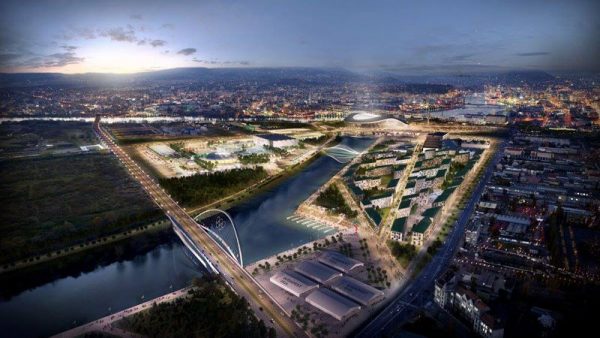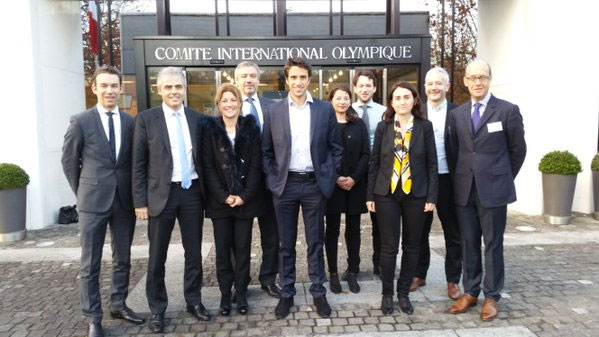As the race for the 2030 Olympic and Paralympic Winter Games ramps up, opposition to Spain’s joint application from Pyrenees-Barcelona has emerged and will push for a ‘no’ result from a promised upcoming referendum.

Spanish Olympic officials have already joined the International Olympic Committee (IOC) in “continuous dialogue” to host a future Olympic Winter Games. The joint bid to host in 2030 is in focus with Barcelona the proposed site for ice events and the mountainous Pyrenees region set for snow competitions.
But some Pyrenees residents have banded together to form ‘Stop JJOO’ (Stop the Olympic Games) with the goal of scheduling the government’s promised referendum and making the result binding, hoping to keep the Games out of the region.
Stop JJOO is concerned that a Winter Games would prioritize the growth of snow sport tourism in the region at a time when climate change could continue to deplete the necessary snowfall. With ski resorts suffering from economic losses due to insufficient natural snow, the opposition believe now is the time to steer the economy in a more viable direction.
“The economic model based on tourism is also causing a big housing problem,” Bernat Lavaquiol, spokesperson for Stop JJOO told GamesBids.com.
“Young people or new families have a hard time finding a house, prices had rapidly increased and touristic rental is capturing all the available houses.”
Lavaquiol said an Olympics could “exacerbate the exodus of young people” from the region who leave to seek education and employment opportunities elsewhere instead of settling for low-paying tourism sector jobs that are already at risk due to the climate crisis. Instead he hopes to see greater investment in public services including education, transportation and healthcare.
The Catalonia government in July 2019 approved a referendum over the 2030 Winter Games in the Pyrenees but has yet to schedule a date as discussions have already begun with the IOC behind closed doors. The new Olympic bid process has lost transparency and all discussions are held secretly with no publicized agenda and no election date pre-scheduled.
In February, the IOC’s Future Host Commission announced that it would be prioritizing Brisbane 2032 for election without any prior warning. In July, the Australian city was elected host city.
Earlier this month Barcelona Mayor Ada Colau called for public consultation in both the Pyrenees and the Catalonia capital ahead of any bid commitment, and she lashed out at Pyrenees government officials for moving forward without already doing so.
Likewise, Lavaquiol vented to GamesBids.com when he explained “everything to do with the Barcelona-Pyrenees 2030 candidacy is being managed from behind in the Pyrenees.”
“The mayors and the population of the Pyrenees do not have any kind of information, but at the same time, the government is presenting the candidacy along with the big construction and tourism companies.
“In other words, multinational companies have more information than the democratic representatives and the residents of the Pyrenees,” he said.
While unveiling the new bid process in 2019, IOC Vice President John Coates said that referendums would be encouraged from jurisdictions that require a vote. These bids would need to show a positive result before being presented to the Executive Board as a “preferred candidate”. The IOC would be under no obligation to wait for such a vote to occur before simply moving forward with another candidate instead.
Merely scheduling a referendum has been a death knell for most bids over the past decade, with nine straight public votes failing to approve such projects across the globe. Budapest’s 2024 Summer Games bid simply crumbled and was withdrawn when a petition forced a binding public vote and government officials wouldn’t risk the political stain of failing.
A 2026 Winter Games bid from Graz in Austria similarly collapsed after a referendum was called.
The IOC’s bid reforms were developed, in part, to eliminate such failed campaigns that have forced the organization to make difficult host choices in recent years. For the 2022 and 2026 Winter Olympics only two projects remained in contention each cycle after several other options dropped out due to the costs, risks and other political factors including referendums.
The last successful vote occurred in 2014 when residents in Oslo, Norway voted 55 percent in favour of hosting the 2022 Olympic Winter Games. Politicians later cancelled that bid due to the costs and risks associated with the event.
Calgary conducted the most recent Olympic bid referendum in 2018 when voters upended the Canadian city’s 2026 Olympic bid with a 56.4 percent ‘no’ vote.
Stop JJOO’s Lavaquiol said he plans to reach out to Calgary 2026 opposition leaders for advice on the upcoming campaign against Pyrenees-Barcelona 2030.
“Stop JJOO has recently been presented and has already gained great strength,” he said.
“We are carrying out outreach work giving talks in all the valleys of the Pyrenees to explain what this 30-day macro-event that will mortgage the next 30 years of the Pyrenees will mean.
“We are preparing a big demonstration at the end of October to hold a show of strength and fortunately we have the scientific community, Olympic athletes and relevant people who in the coming weeks will publish a manifesto asking the Catalan Government to stop this macro-project.”
Stop JJOO also continues to pressure the Catalan government to engage in public consultation and stop the candidacy, and push for the promised referendum. The group has been assured by the Minister of the Presidency that the vote will be scheduled before the Summer in 2022.
Other jurisdictions including Salt Lake City in the United States, Sapporo in Japan, Vancouver in Canada and Ukraine are also discussing their hosting interests with the IOC.
There is strong public support for the project in Salt Lake City while interest is tepid in Vancouver at 55 percent according to a recent poll.
Opinions in Sapporo are split following the controversially-held Tokyo 2020 Games also in Japan, and the Mayor has suggested holding a public vote.
Ukraine’s campaign has just recently emerged, but a bid to host the 2022 Games was withdrawn after the Russian incursion in Crimea in 2014.
On Wednesday Barcelona’s vice mayor announced her city would start a run for the 2036 Summer Games after that Spanish city failed in three consecutive tries. The mayor later denied that a bid has been launched but hinted a project may still be in the works.
Barcelona last hosted the Olympics in 1992 and could become only the second city to host both the Summer and Winter edition after Beijing’s 2022 Winter Games next year.



